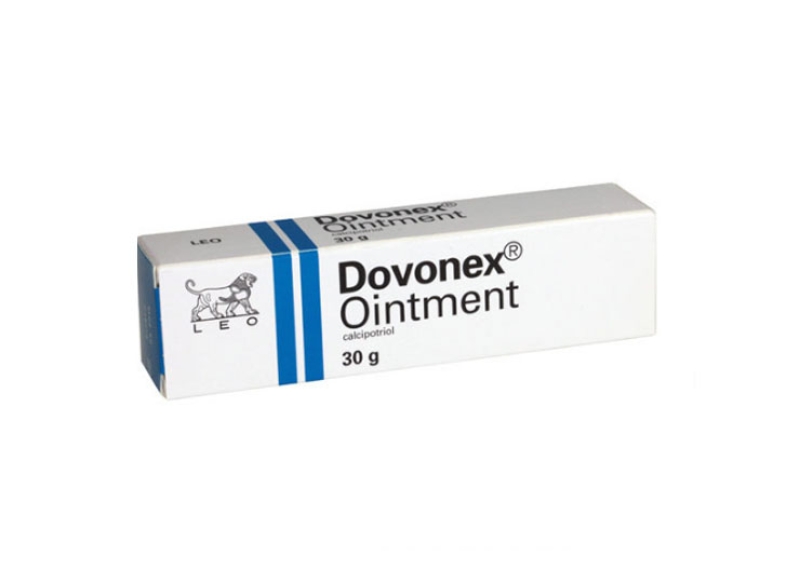Dovonex is a treatment for psoriasis. It contains calcipotriol and is a vitamin D related medication. This is what causes the reduction in skin growth and improves symptoms.
Dovonex will help reduce the symptoms of a psoriasis flare up such as redness, scaling and thickness of the skin. It will help to reduce the amount of skin growth so it helps reduce the amount of excess scaly skin. This also reduces the itching psoriasis can cause. You will notice the scaly and flakey patches of skin will usually clear up first and will feel smoother. The redness of the skin will then start to clear up often from the centre of the plaques first.
Dovonex should be applied to affected areas with psoriasis once or twice a day. Only use on your psoriasis and not on unaffected skin. Do not use Dovonex on your face. Be careful when using Dovonex in skin folds such as armpits or under the breasts. You may be more likely to get skin side effects in these areas. Do not use more than 100 grams a week. If your condition does not improve after 7-10 days of use or worsens, you should stop treatment and contact your doctor.
In the event you miss a dose, it is safe to apply the missed dose as soon as possible. However, if enough time has passed that you should be applying your next dose instead, simply skip the missed dose and resume your typical application schedule.
Follow the instructions below to ensure appropriate use of this medication:
- Remove the cap and check that the seal in the tube is not broken before you first use the ointment
- Squeeze the ointment onto a clean finger
- Rub gently into your skin to cover the affected area of psoriasis until most of the ointment has disappeared into the skin
- Do not bandage, tightly cover or wrap the treated skin area
- Wash your hands well after usingDovobet (unless you are using the ointment to treat your hands). This will avoid accidentally spreading the ointment to other parts of your body (especially the face, scalp, mouth and eyes)
- Do not worry if some ointment accidentally gets on normal skin near your psoriasis, but wipe it off if it spreads too far
- In order to achieve optimal effect, it is recommended not to take a shower or bath immediately after application of Dovobet ointment
Always use this medication exactly as your clinician has told you. Check with our clinical team or your GP or pharmacist if you are not sure.
Medicines and their possible side effects can affect individual people in different ways. The following are some of the side effects that are known to be associated with this medicine. Just because a side effect is stated here, it does not mean that all people using this medicine will experience that or any side effect.
Common side effects include:
- Skin irritation
- Worsening of your psoriasis
- Dermatitis
- Redness
- Flaking skin
- Burning, pain or stinging feeling
- Itchy rash and skin inflammation in the area where the medicine is used
- Itching skin
Dovonex can cause increases in calcium levels in the body so it is important that you do not exceed the recommended dose. Raised calcium levels can produce the following, which must be reported to your GP:
- Increased amounts of urine and/or increased thirst.
- Dry or metallic taste in the mouth
- Stomach pain, nausea, vomiting and constipation
- Weak muscles and/or pain in the bones
- Tiredness, fatigue and confusion
For full information on side effects and correct use, see the patient information leaflet. If any side effects concern you, or you are experiencing any of the side effects mentioned in the patient information leaflet whilst taking this medication, please contact our clinical team or speak to your GP.
You should not use this medicine if you are allergic (hypersensitive) to calcipotriol, betamethasone or any of the other ingredients of Dovonex.
Dovonex may cause photosensitivity which increases the risk of sunburn. Avoid excessive exposure to natural or artificial light after applying.
Over using Dovonex can cause hypercalcemia (elevated blood calcium levels). This can cause your bones to weaken and increases the risk of kidney stones.
If you are pregnant, planning to become pregnant or breastfeeding please inform our clinical team before using this medicine.
Get emergency medical help if you have signs of an allergic reaction to this medication. These include:
- Hives
- Dizziness
- Fast or pounding heartbeats
- Wheezing
- Difficult breathing
- Swelling of your face, lips, tongue, or throat.
It is important that you let us know which prescription, over-the-counter medicines and recreational drugs you are currently taking. You must also tell us about any other medical conditions that you currently have (or had in the past). This will help us ensure the prescribed medication is safe and appropriate for you to take.
For full information on warnings, medication interactions and contraindications, refer to the Patient Information Leaflet. Please read all packaging and the Patient Information Leaflet before taking any new medicine and inform our clinical team or your GP of medicines you are taking or intend to take.







